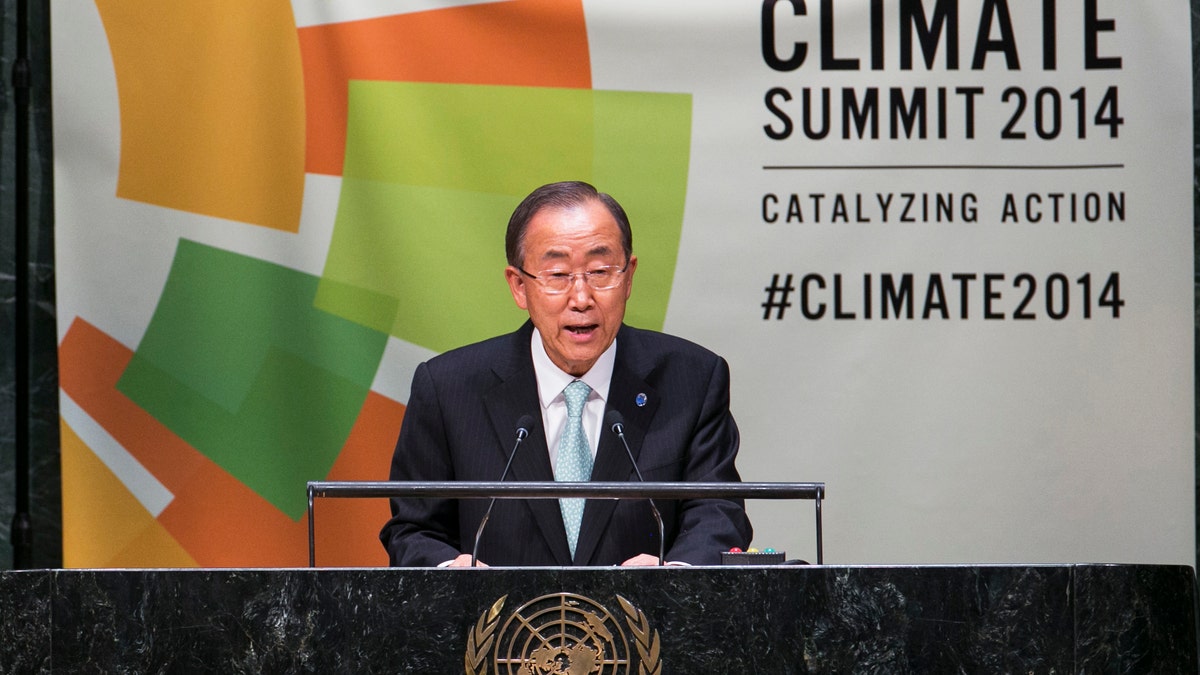
U.N. Secretary General Ban Ki-moon speaks during the Climate Summit. (REUTERS/Lucas Jackson)
U.N. Secretary General Ban Ki-moon lauded the achievements of world leaders attending the Climate Summit in New York this week, touting, in particular, initiatives around carbon pricing and cutting emissions.
“Today’s Summit has shown that we can rise to the climate challenge,” he explained, in the Chair's Summary of the event, which was released late on Tuesday. The Summit is seen as a key milestone on the path to a global climate agreement in December 2015.
In the document, the U.N. chief noted that world leaders committed to limit global temperature rise to less than 2 degrees Celsius from pre-industrial levels. “Many leaders called for all countries to take national actions consistent with a less than 2 degree pathway and a number of countries committed to doing so,” he wrote.
Ban explained that many leaders also advocated for a peak in greenhouse gas emissions before 2020, dramatically reduced emissions thereafter, and climate neutrality in the second half of the century. The E.U. committed to a target of reducing emissions to 40 percent below 1990 levels during the Summit, he noted.
The U.S. plans to release its emissions targets by the first quarter of 2015, according to a submission made to the U.N. Framework Convention on Climate Change (UNFCCC) last week.
Launching the one-day Summit on Tuesday, the U.N. secretary general had urged world leaders to throw their weight fully behind the effort to reduce greenhouse gas emissions, describing climate change as “the defining issue” of our time.
In his Summary, Ban noted that 73 national governments, 11 regional governments, and more than 1,000 businesses and investors had signaled their support for carbon pricing. “Together these leaders represent 52 per cent of global GDP, 54 per cent of global greenhouse gas emissions and almost half of the world’s population,” he wrote.
Launched by the World Bank, the Carbon Pricing Leadership Coalition includes China, Russia, and the U.K. However, the U.S. decided not to join the coalition, which Congress had indicated that it would reject, although 7 American states are members, including California, Massachusetts, and Washington.
The Summary also highlighted the commitment by leaders from more than 40 countries, 30 cities and dozens of companies to double the rate of global energy efficiency by 2030 through vehicle fuel efficiency, lighting, appliances, buildings and district energy.
During the Summit, more than 150 countries, including the U.S., Canada, and the nations of the E.U., set the first ever deadline for ending deforestation by 2030, although this initiative was weakened when Brazil declined to join.
The U.N.’s climate push suffered a number of blows in the run-up to the New York event with Australia’s new government repealing its two-year old national carbon tax, and countries such as Canada, Russia, and Japan refusing to sign on for an extension to the Kyoto Protocol to combat greenhouse gases.
While the Climate Summit has undoubtedly raised the profile of the U.N.’s green agenda, skeptics continue to question the effort to cut carbon emissions, particularly its impact on global economic growth.
“If you look at the big picture of fossil fuels, at the positives and negatives, the only conclusion to draw is that it’s imperative to use more of them, because they are so beneficial to human life,” Alex Epstein, founder of the Center for Industrial Progress, and author of the forthcoming book The Moral Case for Fossil Fuels, told FoxNews.com.
On Monday a study reported that rising temperatures in the Pacific Ocean off the coast of North America over the past century followed natural changes in the wind, as opposed to increases in greenhouse gas emissions.
Follow James Rogers on Twitter @jamesjrogers
The Associated Press contributed to this report








































